Comprehensive Report on Corporate Governance: Principles and Practices
VerifiedAdded on 2022/11/28
|13
|3676
|210
Report
AI Summary
This report provides a comprehensive overview of corporate governance, exploring its significance, elements, and principles. It discusses the roles of stakeholders, including investors, customers, employees, society, and the government, emphasizing the need for ethical behavior and transparency in a globalized economy. The report delves into the importance of corporate governance in ensuring accountability, strategic thinking, and risk management, highlighting the powers of the board, the need for legislation, a sound management environment, independence of the board, code of conduct, and strategic planning. It also addresses financial and operational reporting, risk management, and the integration of corporate social responsibility. Furthermore, the report examines the context of corporate fraud, outlining the system used for directing and controlling business corporations, and the necessary elements for good governance. The conclusion emphasizes the challenges of balancing market opportunities with ethical integrity and the potential of corporate social responsibility to create value for stakeholders.
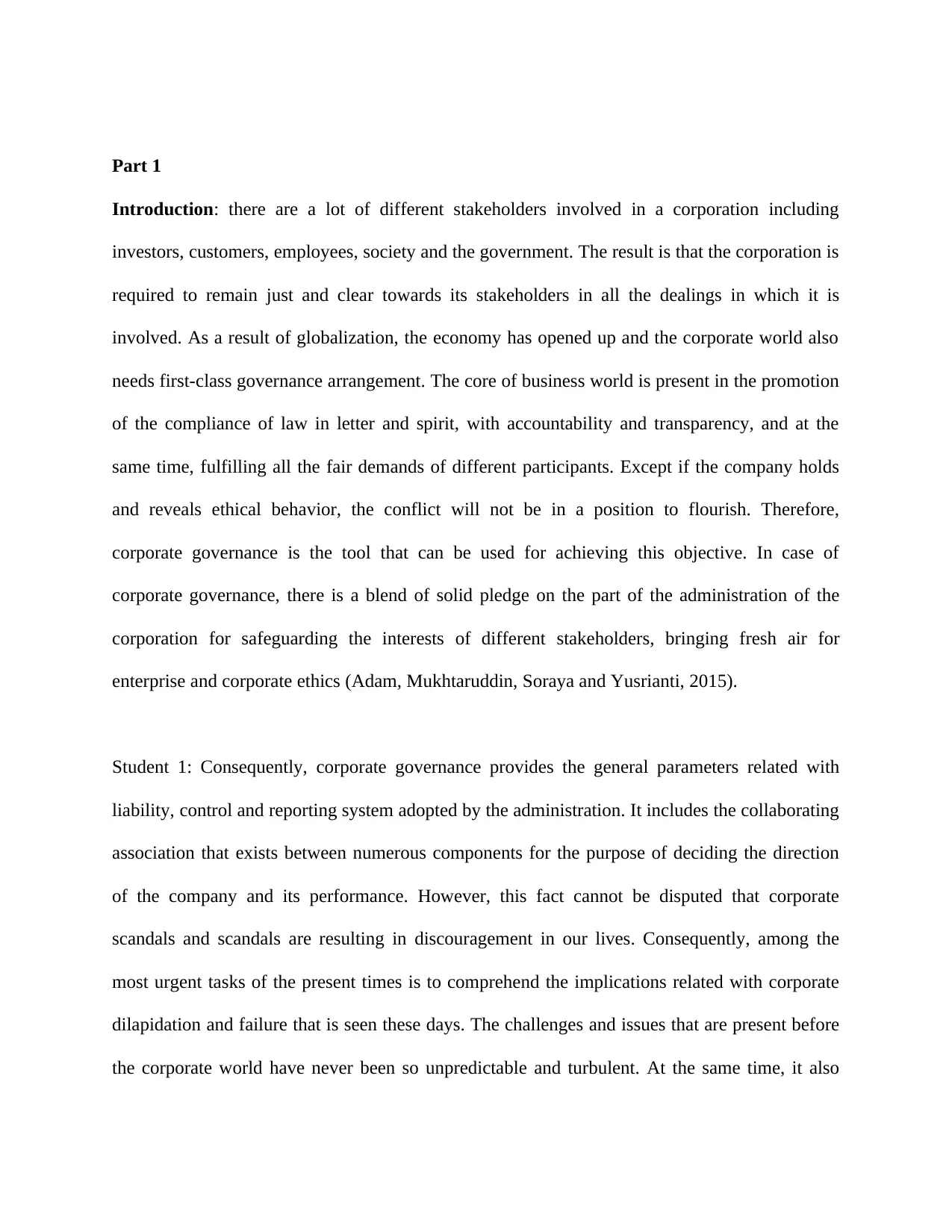
Part 1
Introduction: there are a lot of different stakeholders involved in a corporation including
investors, customers, employees, society and the government. The result is that the corporation is
required to remain just and clear towards its stakeholders in all the dealings in which it is
involved. As a result of globalization, the economy has opened up and the corporate world also
needs first-class governance arrangement. The core of business world is present in the promotion
of the compliance of law in letter and spirit, with accountability and transparency, and at the
same time, fulfilling all the fair demands of different participants. Except if the company holds
and reveals ethical behavior, the conflict will not be in a position to flourish. Therefore,
corporate governance is the tool that can be used for achieving this objective. In case of
corporate governance, there is a blend of solid pledge on the part of the administration of the
corporation for safeguarding the interests of different stakeholders, bringing fresh air for
enterprise and corporate ethics (Adam, Mukhtaruddin, Soraya and Yusrianti, 2015).
Student 1: Consequently, corporate governance provides the general parameters related with
liability, control and reporting system adopted by the administration. It includes the collaborating
association that exists between numerous components for the purpose of deciding the direction
of the company and its performance. However, this fact cannot be disputed that corporate
scandals and scandals are resulting in discouragement in our lives. Consequently, among the
most urgent tasks of the present times is to comprehend the implications related with corporate
dilapidation and failure that is seen these days. The challenges and issues that are present before
the corporate world have never been so unpredictable and turbulent. At the same time, it also
Introduction: there are a lot of different stakeholders involved in a corporation including
investors, customers, employees, society and the government. The result is that the corporation is
required to remain just and clear towards its stakeholders in all the dealings in which it is
involved. As a result of globalization, the economy has opened up and the corporate world also
needs first-class governance arrangement. The core of business world is present in the promotion
of the compliance of law in letter and spirit, with accountability and transparency, and at the
same time, fulfilling all the fair demands of different participants. Except if the company holds
and reveals ethical behavior, the conflict will not be in a position to flourish. Therefore,
corporate governance is the tool that can be used for achieving this objective. In case of
corporate governance, there is a blend of solid pledge on the part of the administration of the
corporation for safeguarding the interests of different stakeholders, bringing fresh air for
enterprise and corporate ethics (Adam, Mukhtaruddin, Soraya and Yusrianti, 2015).
Student 1: Consequently, corporate governance provides the general parameters related with
liability, control and reporting system adopted by the administration. It includes the collaborating
association that exists between numerous components for the purpose of deciding the direction
of the company and its performance. However, this fact cannot be disputed that corporate
scandals and scandals are resulting in discouragement in our lives. Consequently, among the
most urgent tasks of the present times is to comprehend the implications related with corporate
dilapidation and failure that is seen these days. The challenges and issues that are present before
the corporate world have never been so unpredictable and turbulent. At the same time, it also
Paraphrase This Document
Need a fresh take? Get an instant paraphrase of this document with our AI Paraphraser
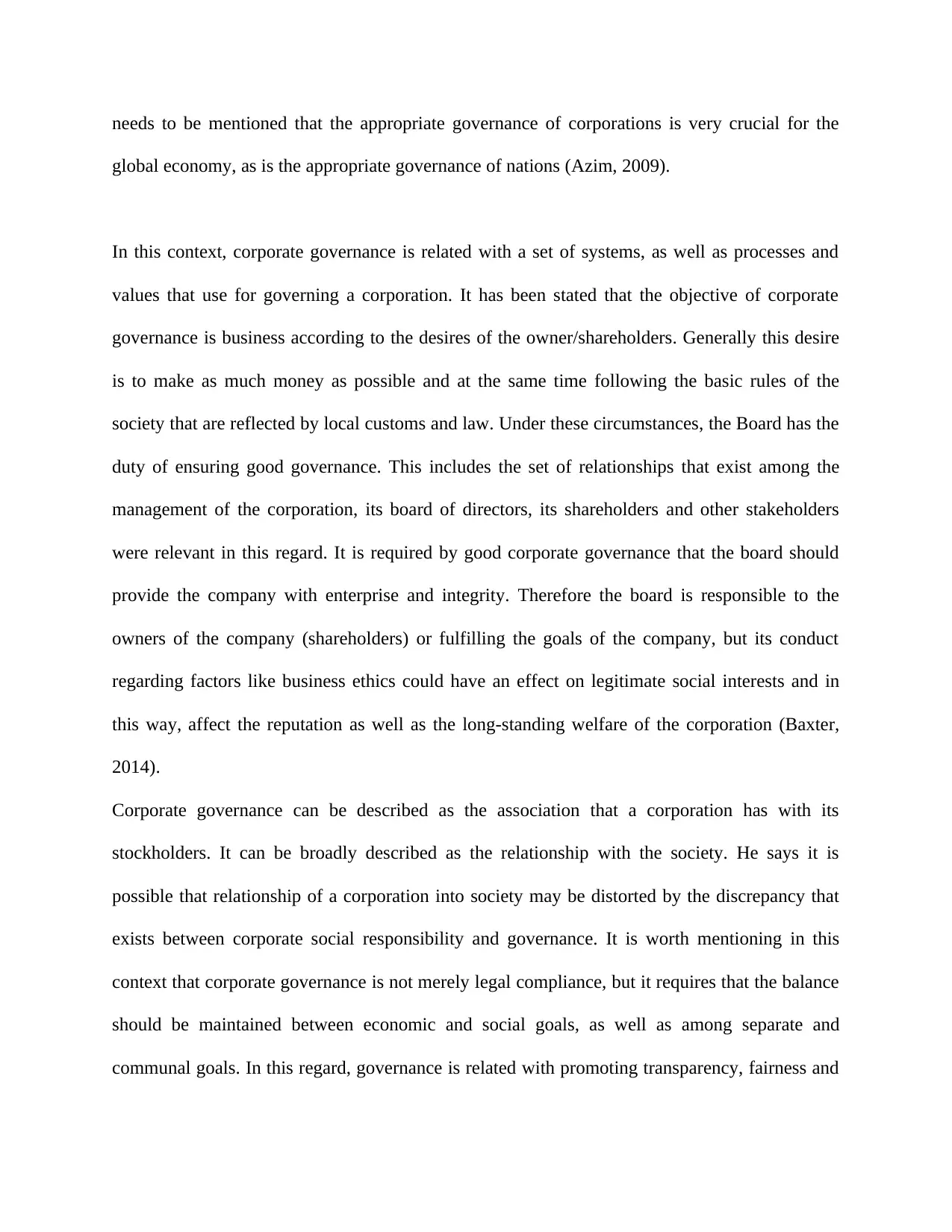
needs to be mentioned that the appropriate governance of corporations is very crucial for the
global economy, as is the appropriate governance of nations (Azim, 2009).
In this context, corporate governance is related with a set of systems, as well as processes and
values that use for governing a corporation. It has been stated that the objective of corporate
governance is business according to the desires of the owner/shareholders. Generally this desire
is to make as much money as possible and at the same time following the basic rules of the
society that are reflected by local customs and law. Under these circumstances, the Board has the
duty of ensuring good governance. This includes the set of relationships that exist among the
management of the corporation, its board of directors, its shareholders and other stakeholders
were relevant in this regard. It is required by good corporate governance that the board should
provide the company with enterprise and integrity. Therefore the board is responsible to the
owners of the company (shareholders) or fulfilling the goals of the company, but its conduct
regarding factors like business ethics could have an effect on legitimate social interests and in
this way, affect the reputation as well as the long-standing welfare of the corporation (Baxter,
2014).
Corporate governance can be described as the association that a corporation has with its
stockholders. It can be broadly described as the relationship with the society. He says it is
possible that relationship of a corporation into society may be distorted by the discrepancy that
exists between corporate social responsibility and governance. It is worth mentioning in this
context that corporate governance is not merely legal compliance, but it requires that the balance
should be maintained between economic and social goals, as well as among separate and
communal goals. In this regard, governance is related with promoting transparency, fairness and
global economy, as is the appropriate governance of nations (Azim, 2009).
In this context, corporate governance is related with a set of systems, as well as processes and
values that use for governing a corporation. It has been stated that the objective of corporate
governance is business according to the desires of the owner/shareholders. Generally this desire
is to make as much money as possible and at the same time following the basic rules of the
society that are reflected by local customs and law. Under these circumstances, the Board has the
duty of ensuring good governance. This includes the set of relationships that exist among the
management of the corporation, its board of directors, its shareholders and other stakeholders
were relevant in this regard. It is required by good corporate governance that the board should
provide the company with enterprise and integrity. Therefore the board is responsible to the
owners of the company (shareholders) or fulfilling the goals of the company, but its conduct
regarding factors like business ethics could have an effect on legitimate social interests and in
this way, affect the reputation as well as the long-standing welfare of the corporation (Baxter,
2014).
Corporate governance can be described as the association that a corporation has with its
stockholders. It can be broadly described as the relationship with the society. He says it is
possible that relationship of a corporation into society may be distorted by the discrepancy that
exists between corporate social responsibility and governance. It is worth mentioning in this
context that corporate governance is not merely legal compliance, but it requires that the balance
should be maintained between economic and social goals, as well as among separate and
communal goals. In this regard, governance is related with promoting transparency, fairness and
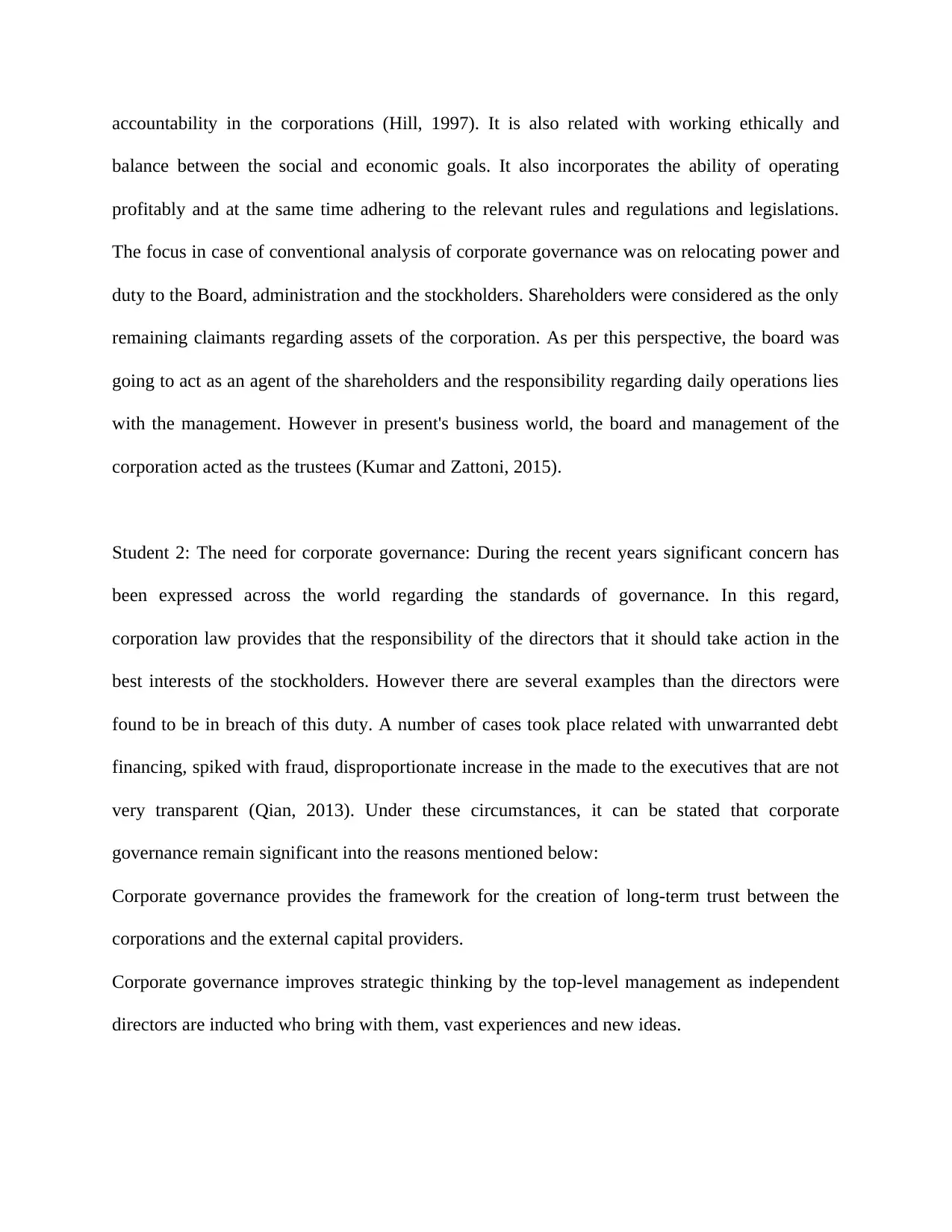
accountability in the corporations (Hill, 1997). It is also related with working ethically and
balance between the social and economic goals. It also incorporates the ability of operating
profitably and at the same time adhering to the relevant rules and regulations and legislations.
The focus in case of conventional analysis of corporate governance was on relocating power and
duty to the Board, administration and the stockholders. Shareholders were considered as the only
remaining claimants regarding assets of the corporation. As per this perspective, the board was
going to act as an agent of the shareholders and the responsibility regarding daily operations lies
with the management. However in present's business world, the board and management of the
corporation acted as the trustees (Kumar and Zattoni, 2015).
Student 2: The need for corporate governance: During the recent years significant concern has
been expressed across the world regarding the standards of governance. In this regard,
corporation law provides that the responsibility of the directors that it should take action in the
best interests of the stockholders. However there are several examples than the directors were
found to be in breach of this duty. A number of cases took place related with unwarranted debt
financing, spiked with fraud, disproportionate increase in the made to the executives that are not
very transparent (Qian, 2013). Under these circumstances, it can be stated that corporate
governance remain significant into the reasons mentioned below:
Corporate governance provides the framework for the creation of long-term trust between the
corporations and the external capital providers.
Corporate governance improves strategic thinking by the top-level management as independent
directors are inducted who bring with them, vast experiences and new ideas.
balance between the social and economic goals. It also incorporates the ability of operating
profitably and at the same time adhering to the relevant rules and regulations and legislations.
The focus in case of conventional analysis of corporate governance was on relocating power and
duty to the Board, administration and the stockholders. Shareholders were considered as the only
remaining claimants regarding assets of the corporation. As per this perspective, the board was
going to act as an agent of the shareholders and the responsibility regarding daily operations lies
with the management. However in present's business world, the board and management of the
corporation acted as the trustees (Kumar and Zattoni, 2015).
Student 2: The need for corporate governance: During the recent years significant concern has
been expressed across the world regarding the standards of governance. In this regard,
corporation law provides that the responsibility of the directors that it should take action in the
best interests of the stockholders. However there are several examples than the directors were
found to be in breach of this duty. A number of cases took place related with unwarranted debt
financing, spiked with fraud, disproportionate increase in the made to the executives that are not
very transparent (Qian, 2013). Under these circumstances, it can be stated that corporate
governance remain significant into the reasons mentioned below:
Corporate governance provides the framework for the creation of long-term trust between the
corporations and the external capital providers.
Corporate governance improves strategic thinking by the top-level management as independent
directors are inducted who bring with them, vast experiences and new ideas.
⊘ This is a preview!⊘
Do you want full access?
Subscribe today to unlock all pages.

Trusted by 1+ million students worldwide
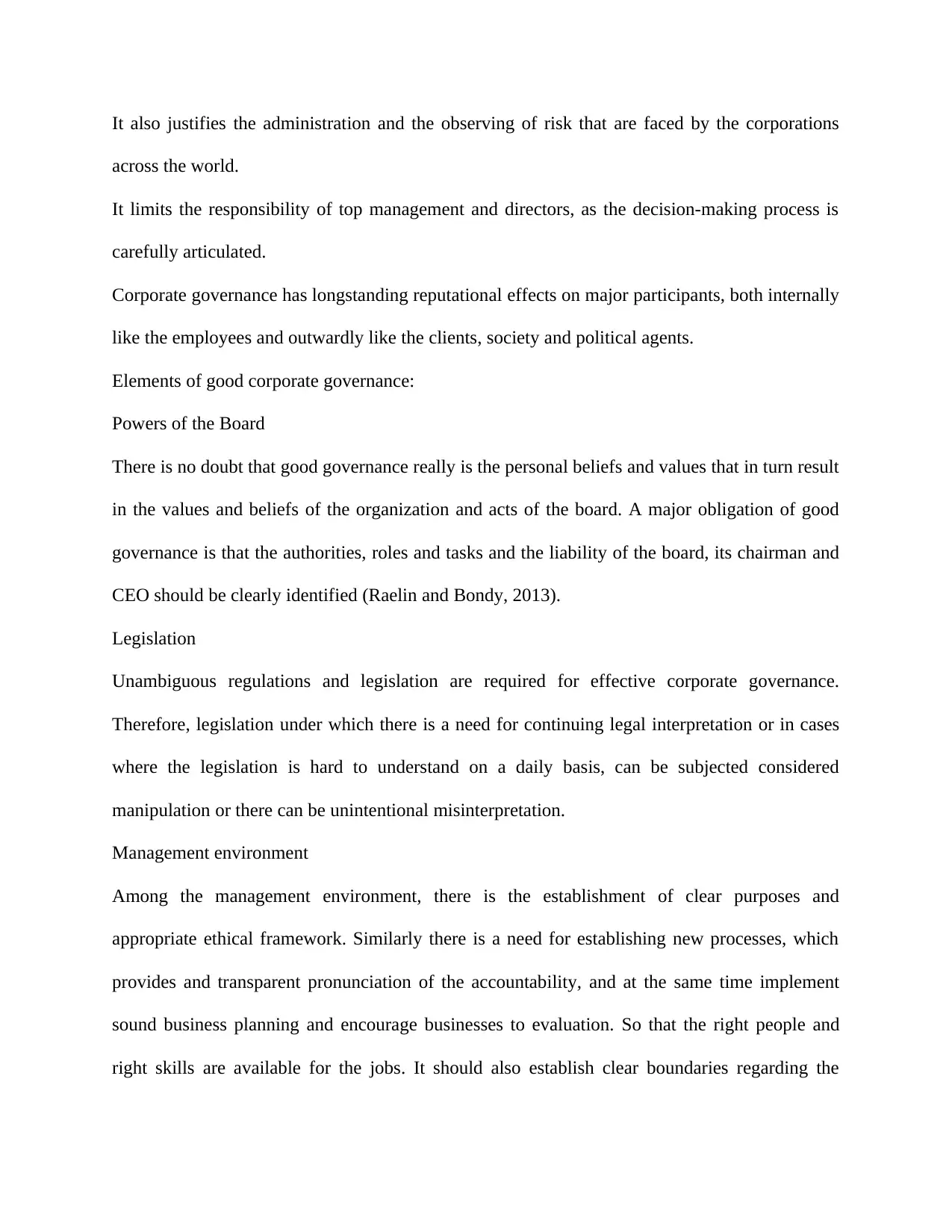
It also justifies the administration and the observing of risk that are faced by the corporations
across the world.
It limits the responsibility of top management and directors, as the decision-making process is
carefully articulated.
Corporate governance has longstanding reputational effects on major participants, both internally
like the employees and outwardly like the clients, society and political agents.
Elements of good corporate governance:
Powers of the Board
There is no doubt that good governance really is the personal beliefs and values that in turn result
in the values and beliefs of the organization and acts of the board. A major obligation of good
governance is that the authorities, roles and tasks and the liability of the board, its chairman and
CEO should be clearly identified (Raelin and Bondy, 2013).
Legislation
Unambiguous regulations and legislation are required for effective corporate governance.
Therefore, legislation under which there is a need for continuing legal interpretation or in cases
where the legislation is hard to understand on a daily basis, can be subjected considered
manipulation or there can be unintentional misinterpretation.
Management environment
Among the management environment, there is the establishment of clear purposes and
appropriate ethical framework. Similarly there is a need for establishing new processes, which
provides and transparent pronunciation of the accountability, and at the same time implement
sound business planning and encourage businesses to evaluation. So that the right people and
right skills are available for the jobs. It should also establish clear boundaries regarding the
across the world.
It limits the responsibility of top management and directors, as the decision-making process is
carefully articulated.
Corporate governance has longstanding reputational effects on major participants, both internally
like the employees and outwardly like the clients, society and political agents.
Elements of good corporate governance:
Powers of the Board
There is no doubt that good governance really is the personal beliefs and values that in turn result
in the values and beliefs of the organization and acts of the board. A major obligation of good
governance is that the authorities, roles and tasks and the liability of the board, its chairman and
CEO should be clearly identified (Raelin and Bondy, 2013).
Legislation
Unambiguous regulations and legislation are required for effective corporate governance.
Therefore, legislation under which there is a need for continuing legal interpretation or in cases
where the legislation is hard to understand on a daily basis, can be subjected considered
manipulation or there can be unintentional misinterpretation.
Management environment
Among the management environment, there is the establishment of clear purposes and
appropriate ethical framework. Similarly there is a need for establishing new processes, which
provides and transparent pronunciation of the accountability, and at the same time implement
sound business planning and encourage businesses to evaluation. So that the right people and
right skills are available for the jobs. It should also establish clear boundaries regarding the
Paraphrase This Document
Need a fresh take? Get an instant paraphrase of this document with our AI Paraphraser
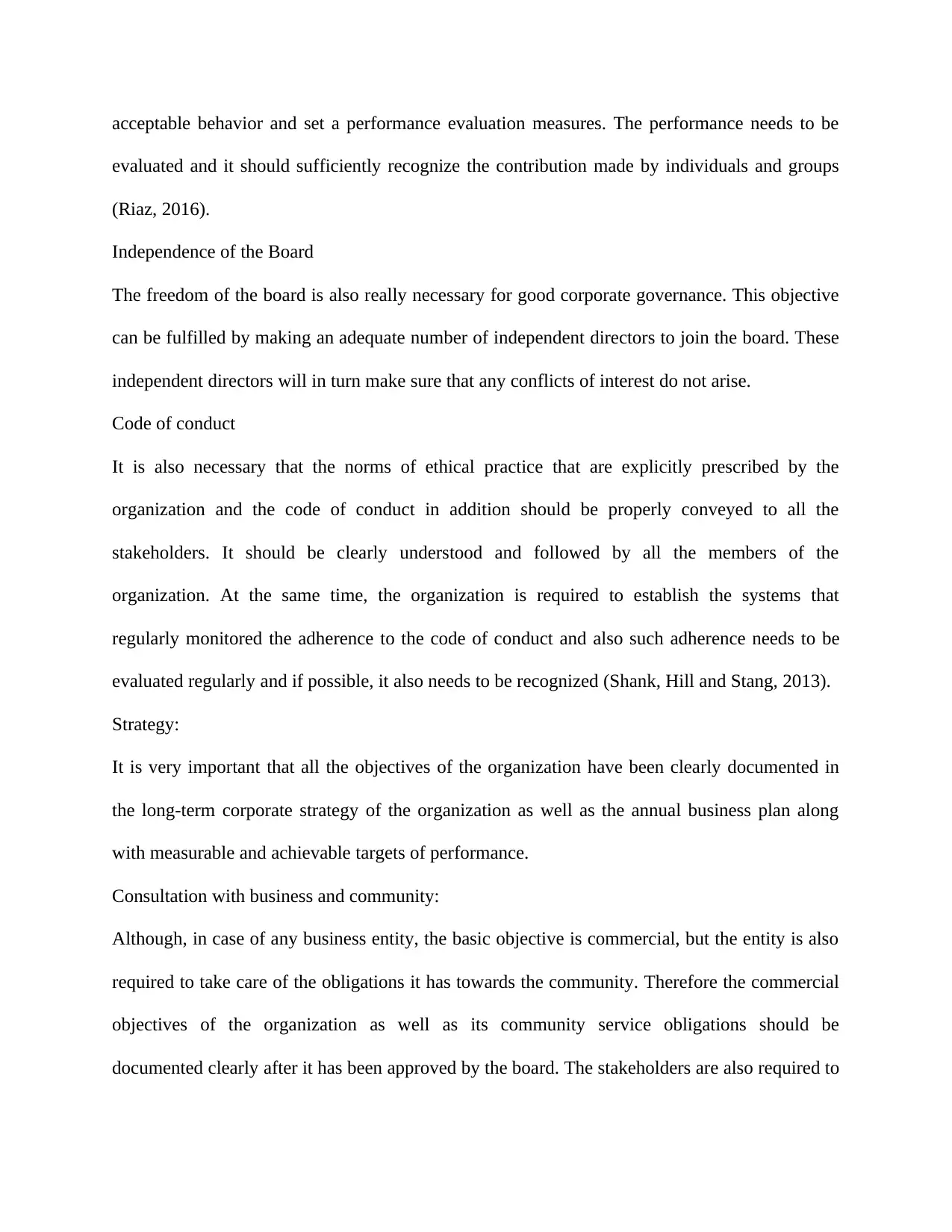
acceptable behavior and set a performance evaluation measures. The performance needs to be
evaluated and it should sufficiently recognize the contribution made by individuals and groups
(Riaz, 2016).
Independence of the Board
The freedom of the board is also really necessary for good corporate governance. This objective
can be fulfilled by making an adequate number of independent directors to join the board. These
independent directors will in turn make sure that any conflicts of interest do not arise.
Code of conduct
It is also necessary that the norms of ethical practice that are explicitly prescribed by the
organization and the code of conduct in addition should be properly conveyed to all the
stakeholders. It should be clearly understood and followed by all the members of the
organization. At the same time, the organization is required to establish the systems that
regularly monitored the adherence to the code of conduct and also such adherence needs to be
evaluated regularly and if possible, it also needs to be recognized (Shank, Hill and Stang, 2013).
Strategy:
It is very important that all the objectives of the organization have been clearly documented in
the long-term corporate strategy of the organization as well as the annual business plan along
with measurable and achievable targets of performance.
Consultation with business and community:
Although, in case of any business entity, the basic objective is commercial, but the entity is also
required to take care of the obligations it has towards the community. Therefore the commercial
objectives of the organization as well as its community service obligations should be
documented clearly after it has been approved by the board. The stakeholders are also required to
evaluated and it should sufficiently recognize the contribution made by individuals and groups
(Riaz, 2016).
Independence of the Board
The freedom of the board is also really necessary for good corporate governance. This objective
can be fulfilled by making an adequate number of independent directors to join the board. These
independent directors will in turn make sure that any conflicts of interest do not arise.
Code of conduct
It is also necessary that the norms of ethical practice that are explicitly prescribed by the
organization and the code of conduct in addition should be properly conveyed to all the
stakeholders. It should be clearly understood and followed by all the members of the
organization. At the same time, the organization is required to establish the systems that
regularly monitored the adherence to the code of conduct and also such adherence needs to be
evaluated regularly and if possible, it also needs to be recognized (Shank, Hill and Stang, 2013).
Strategy:
It is very important that all the objectives of the organization have been clearly documented in
the long-term corporate strategy of the organization as well as the annual business plan along
with measurable and achievable targets of performance.
Consultation with business and community:
Although, in case of any business entity, the basic objective is commercial, but the entity is also
required to take care of the obligations it has towards the community. Therefore the commercial
objectives of the organization as well as its community service obligations should be
documented clearly after it has been approved by the board. The stakeholders are also required to
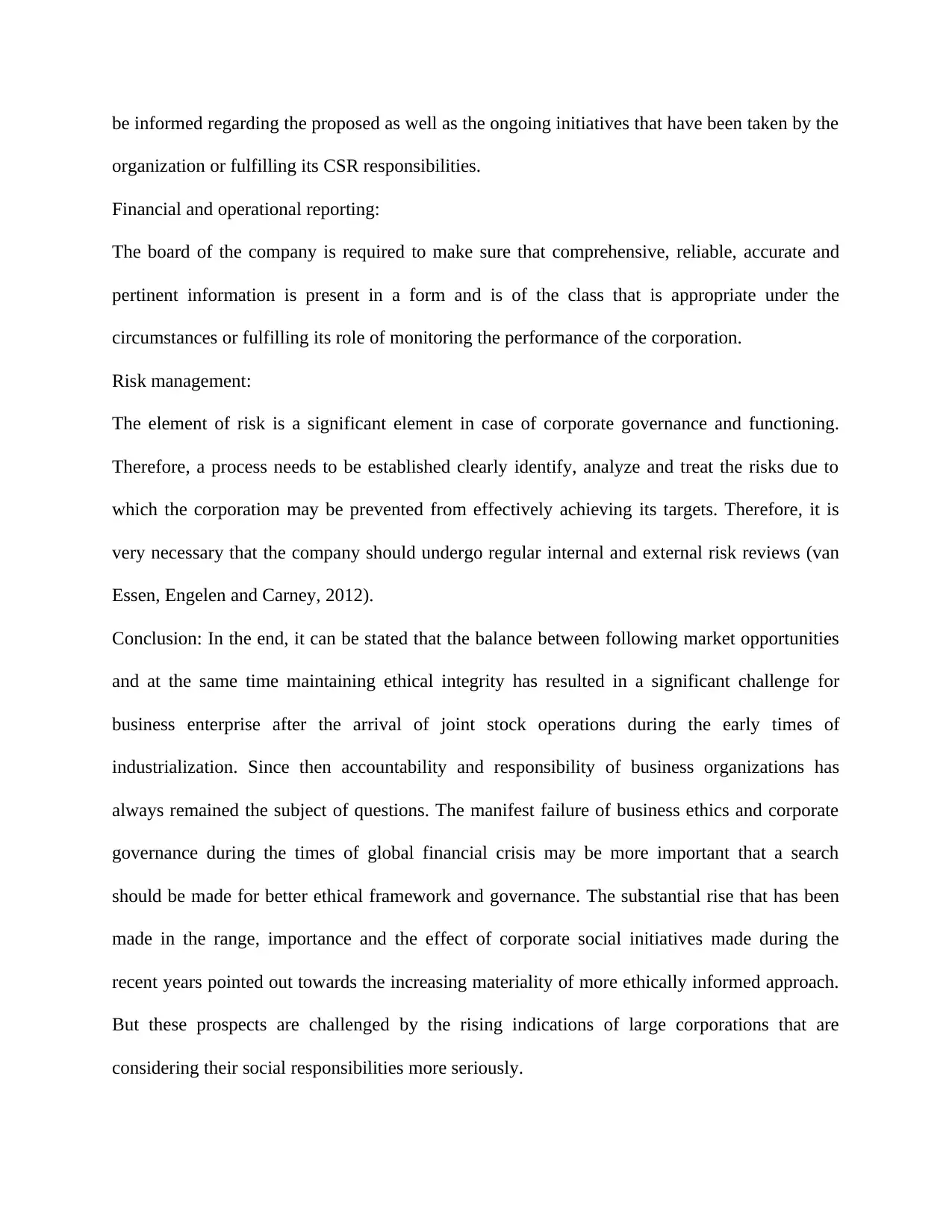
be informed regarding the proposed as well as the ongoing initiatives that have been taken by the
organization or fulfilling its CSR responsibilities.
Financial and operational reporting:
The board of the company is required to make sure that comprehensive, reliable, accurate and
pertinent information is present in a form and is of the class that is appropriate under the
circumstances or fulfilling its role of monitoring the performance of the corporation.
Risk management:
The element of risk is a significant element in case of corporate governance and functioning.
Therefore, a process needs to be established clearly identify, analyze and treat the risks due to
which the corporation may be prevented from effectively achieving its targets. Therefore, it is
very necessary that the company should undergo regular internal and external risk reviews (van
Essen, Engelen and Carney, 2012).
Conclusion: In the end, it can be stated that the balance between following market opportunities
and at the same time maintaining ethical integrity has resulted in a significant challenge for
business enterprise after the arrival of joint stock operations during the early times of
industrialization. Since then accountability and responsibility of business organizations has
always remained the subject of questions. The manifest failure of business ethics and corporate
governance during the times of global financial crisis may be more important that a search
should be made for better ethical framework and governance. The substantial rise that has been
made in the range, importance and the effect of corporate social initiatives made during the
recent years pointed out towards the increasing materiality of more ethically informed approach.
But these prospects are challenged by the rising indications of large corporations that are
considering their social responsibilities more seriously.
organization or fulfilling its CSR responsibilities.
Financial and operational reporting:
The board of the company is required to make sure that comprehensive, reliable, accurate and
pertinent information is present in a form and is of the class that is appropriate under the
circumstances or fulfilling its role of monitoring the performance of the corporation.
Risk management:
The element of risk is a significant element in case of corporate governance and functioning.
Therefore, a process needs to be established clearly identify, analyze and treat the risks due to
which the corporation may be prevented from effectively achieving its targets. Therefore, it is
very necessary that the company should undergo regular internal and external risk reviews (van
Essen, Engelen and Carney, 2012).
Conclusion: In the end, it can be stated that the balance between following market opportunities
and at the same time maintaining ethical integrity has resulted in a significant challenge for
business enterprise after the arrival of joint stock operations during the early times of
industrialization. Since then accountability and responsibility of business organizations has
always remained the subject of questions. The manifest failure of business ethics and corporate
governance during the times of global financial crisis may be more important that a search
should be made for better ethical framework and governance. The substantial rise that has been
made in the range, importance and the effect of corporate social initiatives made during the
recent years pointed out towards the increasing materiality of more ethically informed approach.
But these prospects are challenged by the rising indications of large corporations that are
considering their social responsibilities more seriously.
⊘ This is a preview!⊘
Do you want full access?
Subscribe today to unlock all pages.

Trusted by 1+ million students worldwide

It is also worth mentioning that the effective integration of corporate social responsibility may
release greater value for the shareholders and also for other stakeholders: by moving beyond
compliance and for the purpose of creating new value with the introduction of new products and
services that fulfill the needs of the society and by collaborating for solving demanding and
complex social problems that have the potential of growing beyond control. This will result in
vital context where people will have more chances of exercising ethical commitments and moral
values. But the corporations that have the potential of working in the interest of investors,
stakeholders and the society, required for their basic redesigning of the concept of the
corporation and the market institution. Therefore, by confronting the dilemmas of economic,
social and ecological survival that is faced by the governments, business and community will
result in forcing DVD thinking regarding corporate structures, objectives and the activities.
release greater value for the shareholders and also for other stakeholders: by moving beyond
compliance and for the purpose of creating new value with the introduction of new products and
services that fulfill the needs of the society and by collaborating for solving demanding and
complex social problems that have the potential of growing beyond control. This will result in
vital context where people will have more chances of exercising ethical commitments and moral
values. But the corporations that have the potential of working in the interest of investors,
stakeholders and the society, required for their basic redesigning of the concept of the
corporation and the market institution. Therefore, by confronting the dilemmas of economic,
social and ecological survival that is faced by the governments, business and community will
result in forcing DVD thinking regarding corporate structures, objectives and the activities.
Paraphrase This Document
Need a fresh take? Get an instant paraphrase of this document with our AI Paraphraser
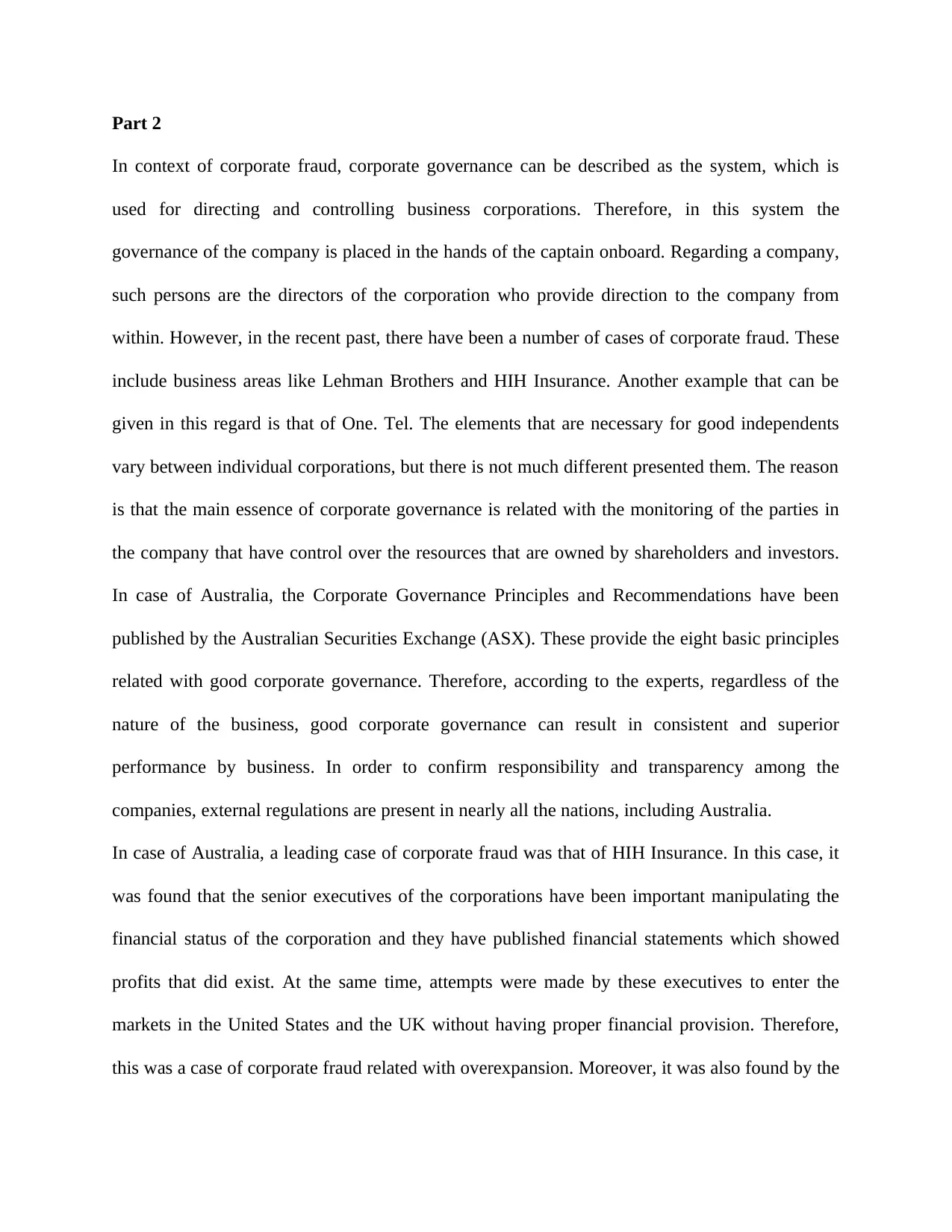
Part 2
In context of corporate fraud, corporate governance can be described as the system, which is
used for directing and controlling business corporations. Therefore, in this system the
governance of the company is placed in the hands of the captain onboard. Regarding a company,
such persons are the directors of the corporation who provide direction to the company from
within. However, in the recent past, there have been a number of cases of corporate fraud. These
include business areas like Lehman Brothers and HIH Insurance. Another example that can be
given in this regard is that of One. Tel. The elements that are necessary for good independents
vary between individual corporations, but there is not much different presented them. The reason
is that the main essence of corporate governance is related with the monitoring of the parties in
the company that have control over the resources that are owned by shareholders and investors.
In case of Australia, the Corporate Governance Principles and Recommendations have been
published by the Australian Securities Exchange (ASX). These provide the eight basic principles
related with good corporate governance. Therefore, according to the experts, regardless of the
nature of the business, good corporate governance can result in consistent and superior
performance by business. In order to confirm responsibility and transparency among the
companies, external regulations are present in nearly all the nations, including Australia.
In case of Australia, a leading case of corporate fraud was that of HIH Insurance. In this case, it
was found that the senior executives of the corporations have been important manipulating the
financial status of the corporation and they have published financial statements which showed
profits that did exist. At the same time, attempts were made by these executives to enter the
markets in the United States and the UK without having proper financial provision. Therefore,
this was a case of corporate fraud related with overexpansion. Moreover, it was also found by the
In context of corporate fraud, corporate governance can be described as the system, which is
used for directing and controlling business corporations. Therefore, in this system the
governance of the company is placed in the hands of the captain onboard. Regarding a company,
such persons are the directors of the corporation who provide direction to the company from
within. However, in the recent past, there have been a number of cases of corporate fraud. These
include business areas like Lehman Brothers and HIH Insurance. Another example that can be
given in this regard is that of One. Tel. The elements that are necessary for good independents
vary between individual corporations, but there is not much different presented them. The reason
is that the main essence of corporate governance is related with the monitoring of the parties in
the company that have control over the resources that are owned by shareholders and investors.
In case of Australia, the Corporate Governance Principles and Recommendations have been
published by the Australian Securities Exchange (ASX). These provide the eight basic principles
related with good corporate governance. Therefore, according to the experts, regardless of the
nature of the business, good corporate governance can result in consistent and superior
performance by business. In order to confirm responsibility and transparency among the
companies, external regulations are present in nearly all the nations, including Australia.
In case of Australia, a leading case of corporate fraud was that of HIH Insurance. In this case, it
was found that the senior executives of the corporations have been important manipulating the
financial status of the corporation and they have published financial statements which showed
profits that did exist. At the same time, attempts were made by these executives to enter the
markets in the United States and the UK without having proper financial provision. Therefore,
this was a case of corporate fraud related with overexpansion. Moreover, it was also found by the
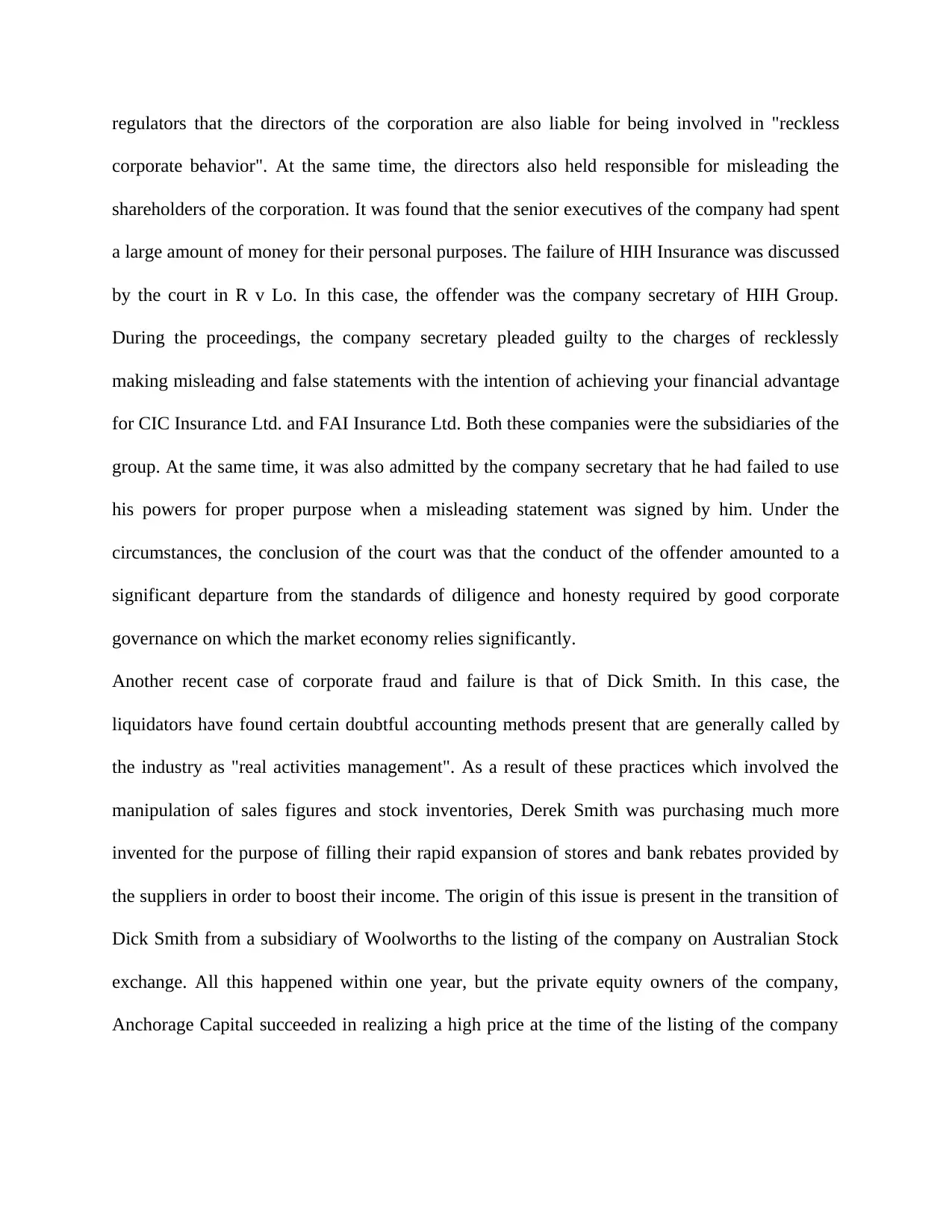
regulators that the directors of the corporation are also liable for being involved in "reckless
corporate behavior". At the same time, the directors also held responsible for misleading the
shareholders of the corporation. It was found that the senior executives of the company had spent
a large amount of money for their personal purposes. The failure of HIH Insurance was discussed
by the court in R v Lo. In this case, the offender was the company secretary of HIH Group.
During the proceedings, the company secretary pleaded guilty to the charges of recklessly
making misleading and false statements with the intention of achieving your financial advantage
for CIC Insurance Ltd. and FAI Insurance Ltd. Both these companies were the subsidiaries of the
group. At the same time, it was also admitted by the company secretary that he had failed to use
his powers for proper purpose when a misleading statement was signed by him. Under the
circumstances, the conclusion of the court was that the conduct of the offender amounted to a
significant departure from the standards of diligence and honesty required by good corporate
governance on which the market economy relies significantly.
Another recent case of corporate fraud and failure is that of Dick Smith. In this case, the
liquidators have found certain doubtful accounting methods present that are generally called by
the industry as "real activities management". As a result of these practices which involved the
manipulation of sales figures and stock inventories, Derek Smith was purchasing much more
invented for the purpose of filling their rapid expansion of stores and bank rebates provided by
the suppliers in order to boost their income. The origin of this issue is present in the transition of
Dick Smith from a subsidiary of Woolworths to the listing of the company on Australian Stock
exchange. All this happened within one year, but the private equity owners of the company,
Anchorage Capital succeeded in realizing a high price at the time of the listing of the company
corporate behavior". At the same time, the directors also held responsible for misleading the
shareholders of the corporation. It was found that the senior executives of the company had spent
a large amount of money for their personal purposes. The failure of HIH Insurance was discussed
by the court in R v Lo. In this case, the offender was the company secretary of HIH Group.
During the proceedings, the company secretary pleaded guilty to the charges of recklessly
making misleading and false statements with the intention of achieving your financial advantage
for CIC Insurance Ltd. and FAI Insurance Ltd. Both these companies were the subsidiaries of the
group. At the same time, it was also admitted by the company secretary that he had failed to use
his powers for proper purpose when a misleading statement was signed by him. Under the
circumstances, the conclusion of the court was that the conduct of the offender amounted to a
significant departure from the standards of diligence and honesty required by good corporate
governance on which the market economy relies significantly.
Another recent case of corporate fraud and failure is that of Dick Smith. In this case, the
liquidators have found certain doubtful accounting methods present that are generally called by
the industry as "real activities management". As a result of these practices which involved the
manipulation of sales figures and stock inventories, Derek Smith was purchasing much more
invented for the purpose of filling their rapid expansion of stores and bank rebates provided by
the suppliers in order to boost their income. The origin of this issue is present in the transition of
Dick Smith from a subsidiary of Woolworths to the listing of the company on Australian Stock
exchange. All this happened within one year, but the private equity owners of the company,
Anchorage Capital succeeded in realizing a high price at the time of the listing of the company
⊘ This is a preview!⊘
Do you want full access?
Subscribe today to unlock all pages.

Trusted by 1+ million students worldwide
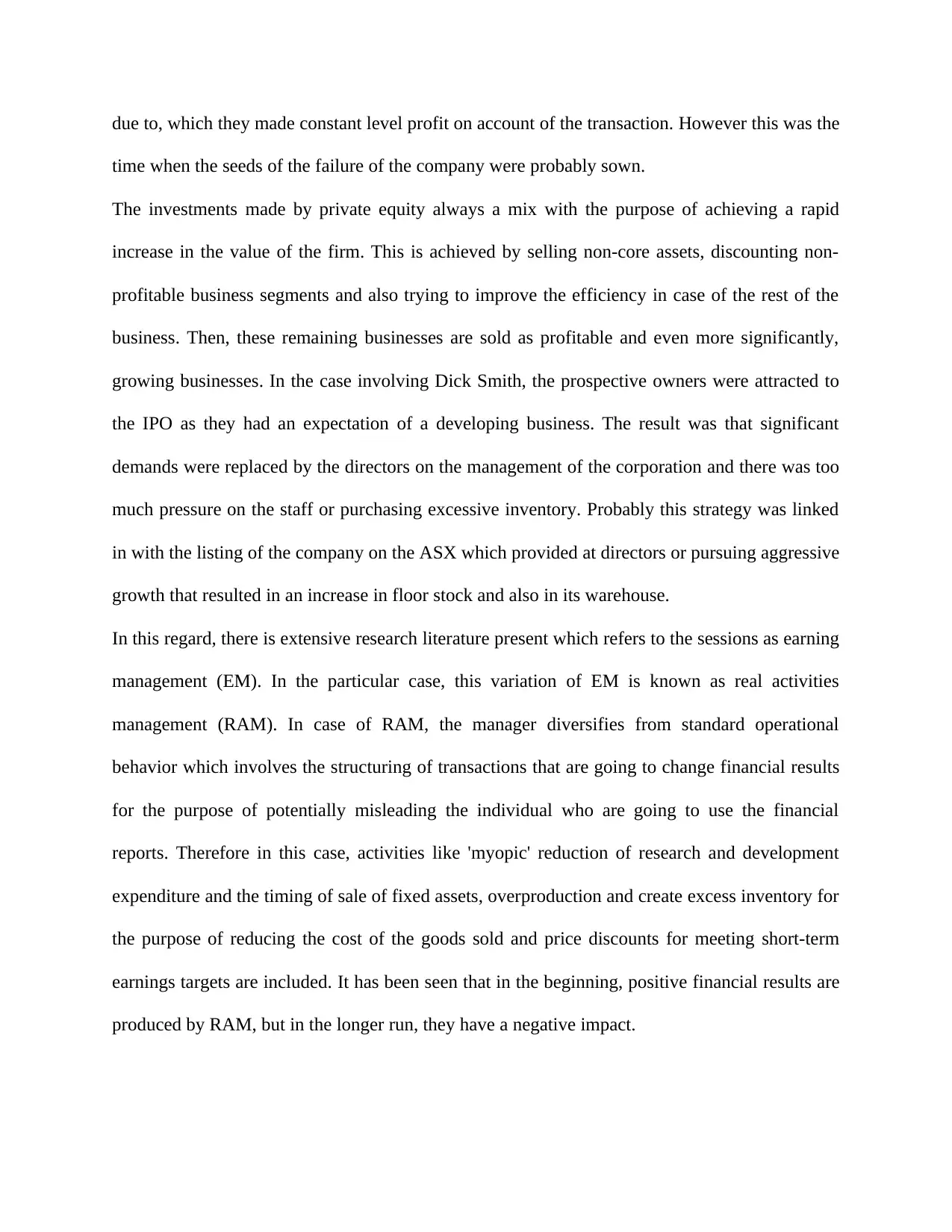
due to, which they made constant level profit on account of the transaction. However this was the
time when the seeds of the failure of the company were probably sown.
The investments made by private equity always a mix with the purpose of achieving a rapid
increase in the value of the firm. This is achieved by selling non-core assets, discounting non-
profitable business segments and also trying to improve the efficiency in case of the rest of the
business. Then, these remaining businesses are sold as profitable and even more significantly,
growing businesses. In the case involving Dick Smith, the prospective owners were attracted to
the IPO as they had an expectation of a developing business. The result was that significant
demands were replaced by the directors on the management of the corporation and there was too
much pressure on the staff or purchasing excessive inventory. Probably this strategy was linked
in with the listing of the company on the ASX which provided at directors or pursuing aggressive
growth that resulted in an increase in floor stock and also in its warehouse.
In this regard, there is extensive research literature present which refers to the sessions as earning
management (EM). In the particular case, this variation of EM is known as real activities
management (RAM). In case of RAM, the manager diversifies from standard operational
behavior which involves the structuring of transactions that are going to change financial results
for the purpose of potentially misleading the individual who are going to use the financial
reports. Therefore in this case, activities like 'myopic' reduction of research and development
expenditure and the timing of sale of fixed assets, overproduction and create excess inventory for
the purpose of reducing the cost of the goods sold and price discounts for meeting short-term
earnings targets are included. It has been seen that in the beginning, positive financial results are
produced by RAM, but in the longer run, they have a negative impact.
time when the seeds of the failure of the company were probably sown.
The investments made by private equity always a mix with the purpose of achieving a rapid
increase in the value of the firm. This is achieved by selling non-core assets, discounting non-
profitable business segments and also trying to improve the efficiency in case of the rest of the
business. Then, these remaining businesses are sold as profitable and even more significantly,
growing businesses. In the case involving Dick Smith, the prospective owners were attracted to
the IPO as they had an expectation of a developing business. The result was that significant
demands were replaced by the directors on the management of the corporation and there was too
much pressure on the staff or purchasing excessive inventory. Probably this strategy was linked
in with the listing of the company on the ASX which provided at directors or pursuing aggressive
growth that resulted in an increase in floor stock and also in its warehouse.
In this regard, there is extensive research literature present which refers to the sessions as earning
management (EM). In the particular case, this variation of EM is known as real activities
management (RAM). In case of RAM, the manager diversifies from standard operational
behavior which involves the structuring of transactions that are going to change financial results
for the purpose of potentially misleading the individual who are going to use the financial
reports. Therefore in this case, activities like 'myopic' reduction of research and development
expenditure and the timing of sale of fixed assets, overproduction and create excess inventory for
the purpose of reducing the cost of the goods sold and price discounts for meeting short-term
earnings targets are included. It has been seen that in the beginning, positive financial results are
produced by RAM, but in the longer run, they have a negative impact.
Paraphrase This Document
Need a fresh take? Get an instant paraphrase of this document with our AI Paraphraser
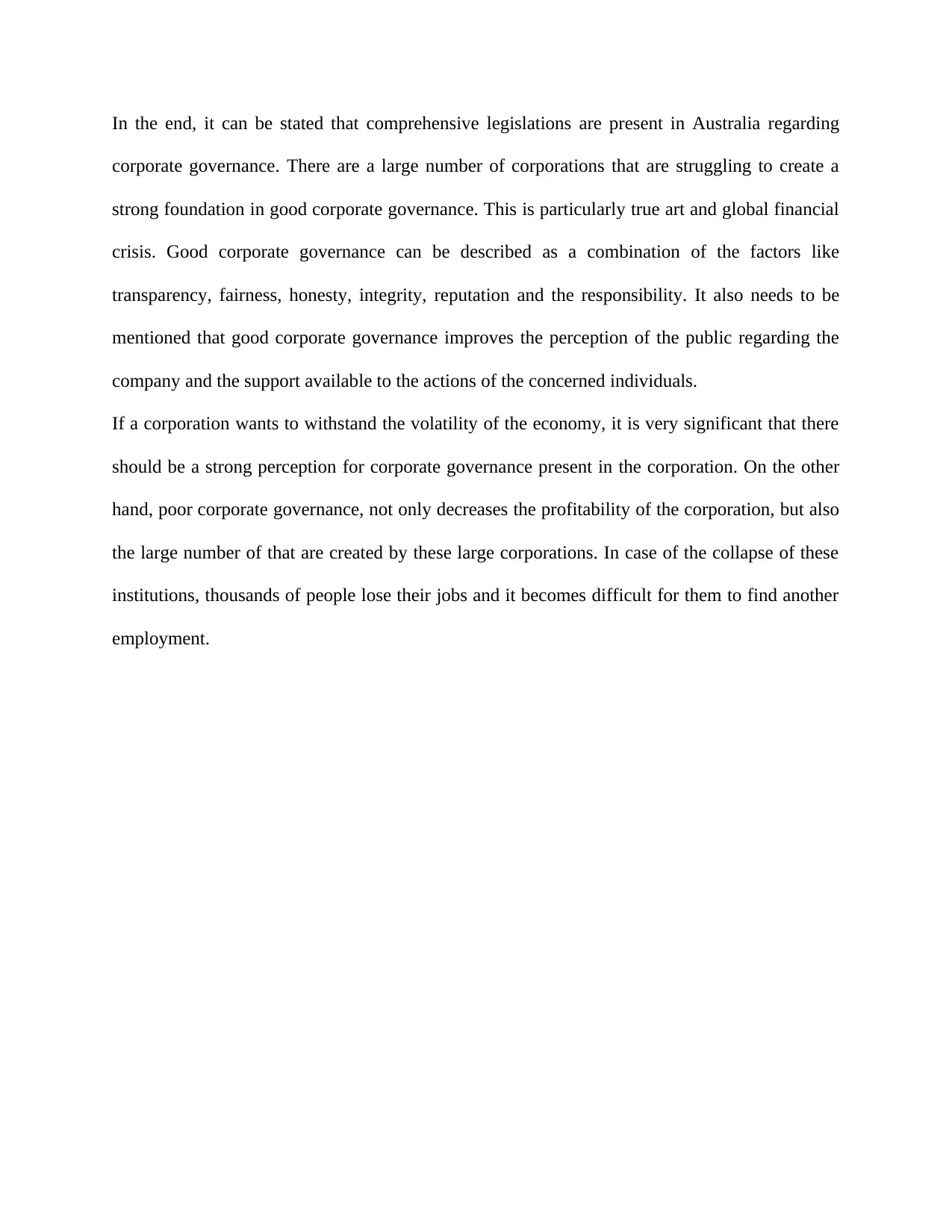
In the end, it can be stated that comprehensive legislations are present in Australia regarding
corporate governance. There are a large number of corporations that are struggling to create a
strong foundation in good corporate governance. This is particularly true art and global financial
crisis. Good corporate governance can be described as a combination of the factors like
transparency, fairness, honesty, integrity, reputation and the responsibility. It also needs to be
mentioned that good corporate governance improves the perception of the public regarding the
company and the support available to the actions of the concerned individuals.
If a corporation wants to withstand the volatility of the economy, it is very significant that there
should be a strong perception for corporate governance present in the corporation. On the other
hand, poor corporate governance, not only decreases the profitability of the corporation, but also
the large number of that are created by these large corporations. In case of the collapse of these
institutions, thousands of people lose their jobs and it becomes difficult for them to find another
employment.
corporate governance. There are a large number of corporations that are struggling to create a
strong foundation in good corporate governance. This is particularly true art and global financial
crisis. Good corporate governance can be described as a combination of the factors like
transparency, fairness, honesty, integrity, reputation and the responsibility. It also needs to be
mentioned that good corporate governance improves the perception of the public regarding the
company and the support available to the actions of the concerned individuals.
If a corporation wants to withstand the volatility of the economy, it is very significant that there
should be a strong perception for corporate governance present in the corporation. On the other
hand, poor corporate governance, not only decreases the profitability of the corporation, but also
the large number of that are created by these large corporations. In case of the collapse of these
institutions, thousands of people lose their jobs and it becomes difficult for them to find another
employment.

References
Adam, M., Mukhtaruddin, M., Soraya, N. and Yusrianti, H. (2015). Good Corporate Governance
and Cost of Debt: Listed Companies on Indonesian Institute for Corporate Governance. Asian
Social Science.
Azim, M. (2009). Role Of Monitoring Within A Good Corporate Governance Structure:
Evidence From Australia. Corporate Board: role, duties and composition, 5(3).
Baxter, P. (2014). Corporate governance ratings and financial performance: evidence from
Australia. International Journal of Corporate Governance, 5(3/4), p.178.
Hill, J. (1997). Remuneration Disclosure in Australia and the United States. Corporate
Governance, 5(2), pp.60-66.
Kumar, P. and Zattoni, A. (2015). Ownership Structure, Corporate Governance and Firm
Performance. Corporate Governance: An International Review, 23(6), pp.469-471.
Qian, W. (2013). Legitimacy Or Good Governance: What Drives Carbon Performance In
Australia. Corporate Ownership and Control, 10(3).
Raelin, J. and Bondy, K. (2013). Putting the Good Back in Good Corporate Governance: The
Presence and Problems of Double-Layered Agency Theory. Corporate Governance: An
International Review, 21(5), pp.420-435.
Adam, M., Mukhtaruddin, M., Soraya, N. and Yusrianti, H. (2015). Good Corporate Governance
and Cost of Debt: Listed Companies on Indonesian Institute for Corporate Governance. Asian
Social Science.
Azim, M. (2009). Role Of Monitoring Within A Good Corporate Governance Structure:
Evidence From Australia. Corporate Board: role, duties and composition, 5(3).
Baxter, P. (2014). Corporate governance ratings and financial performance: evidence from
Australia. International Journal of Corporate Governance, 5(3/4), p.178.
Hill, J. (1997). Remuneration Disclosure in Australia and the United States. Corporate
Governance, 5(2), pp.60-66.
Kumar, P. and Zattoni, A. (2015). Ownership Structure, Corporate Governance and Firm
Performance. Corporate Governance: An International Review, 23(6), pp.469-471.
Qian, W. (2013). Legitimacy Or Good Governance: What Drives Carbon Performance In
Australia. Corporate Ownership and Control, 10(3).
Raelin, J. and Bondy, K. (2013). Putting the Good Back in Good Corporate Governance: The
Presence and Problems of Double-Layered Agency Theory. Corporate Governance: An
International Review, 21(5), pp.420-435.
⊘ This is a preview!⊘
Do you want full access?
Subscribe today to unlock all pages.

Trusted by 1+ million students worldwide
1 out of 13
Related Documents
Your All-in-One AI-Powered Toolkit for Academic Success.
+13062052269
info@desklib.com
Available 24*7 on WhatsApp / Email
![[object Object]](/_next/static/media/star-bottom.7253800d.svg)
Unlock your academic potential
Copyright © 2020–2026 A2Z Services. All Rights Reserved. Developed and managed by ZUCOL.





